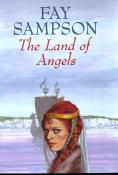 Sampson, Fay. The Land of Angels. Robert Hale, 2006. £18.99. ISBN 0709080972.
Sampson, Fay. The Land of Angels. Robert Hale, 2006. £18.99. ISBN 0709080972.Over the weekend I finished reading Sampson's latest novel, about the coming of Christianity to England in the late 6th century. It's seen from the viewpoint of two of the religion's greatest proponents in that mostly pagan land: Bertha, daughter of Charibert, the Christian king of Paris, who makes a political marriage with Aethelbert, the heathen King of Kent; and the future St. Augustine, a Roman monk persuaded to lead a mission to Britain by his friend, Pope Gregory the Great.
For a 224-page book (most Robert Hale novels adhere to this length) the novel is surprisingly dense, more so than Sampson's previous works. The print is fairly small. Yet despite the amount of historical detail, for the most part, the novel wears its learning lightly. Her prose is smooth and natural, and aside from a few exceptions early on, I never felt like I was being lectured to; also, despite the heavy emphasis on religion, the tone never feels preachy. I suspect readers of Christian fiction will find much to enjoy here, and it makes me wonder why no other authors (am I missing anything?) have chosen to fictionalize this critical time in history before.
Sampson portrays Bertha as a strong-willed Christian princess, convinced of her right to worship as she chooses despite being a foreigner in a pagan land. In doing so, she earns her new husband's respect, though he remains unconvinced of Christianity's relevance to the realm until the arrival of Augustine, some twenty years later. As for Augustine, he very reluctantly agrees to travel overland (and across the Channel) to England after it becomes clear that Pope Gregory means to extend the Church's influence in the British Isles. Not surprisingly given the title, Sampson relates the legend about Gregory's first encounter with English people; "Not Angles," he declares of the blond slave boys he sees in the Roman marketplace, "but angels." Though obedient to his superior's will, Augustine very clearly lacks Gregory's charm, humility, and self-confidence, which doesn't win him many friends. However, he gradually earns his flock's admiration and loyalty through sheer determination; this only increases when miracles begin to happen.
Because The Land of Angels is seen only from the Christian viewpoint, one never gets a chance to learn more about the beliefs of Aethelbert and his people. Indeed, their rituals seem not only confusing to the reader, but also bizarre and repulsive; Bertha is outraged that her marriage ceremony involves jumping over a fire and bloody animal sacrifice. I did wonder that after 20 years of relatively happy marriage, she seems to understand her husband's beliefs not at all, but it's also made clear that Aethelbert finds the Christian way of worship equally outlandish - at least until Augustine arrives in 597 AD, and Aethelbert finds in this new religion a way of consolidating his power across the island. Also, in the novel's last half, Bertha's story becomes a sidenote, with the plot following Augustine and his monks - and their futile efforts to bring their Welsh counterparts in line with Rome - almost exclusively.
Yet these are very minor complaints in what is a well-told, entertaining, and, from what I can tell, historically sensitive novel. While the tone lacks the mystical qualities and lavish descriptions found in Melvyn Bragg's Credo (The Sword and the Miracle), for example, the historical atmosphere is well described. The novel ends with many plot points unresolved, for the Synod of Whitby is half a century away, and Bertha's eldest son refuses to cut ties with the priests of Woden. While Christianity has gained a firm foothold on the island, its future is still uncertain. The door's left wide open for a sequel, and I hope there is one.




Sounds fascinating! Thanks for the review.
ReplyDeleteI have a copy of this on order but it hasn't arrived yet, so you beat me to it! Re the possibility of a sequel, in an interview, the author mentions that she had written a huge novel spanning the period from St Auustine to the Synod of Whitby, and that although it hadn't found a publisher in its original form, some sections of it are starting to find their way into print. Land of Angels might well be one of those sections, in which case there may well be more to come. Her novel Flight of the Sparrow also has a distinct feeling of being part of a larger whole.
ReplyDeleteThanks for the interview link. I'm guessing you're right, that Land of Angels is part of that larger novel. It ends at a natural point for some plot elements but not for others, so that makes perfect sense.
ReplyDeleteI do wish this one wasn't so expensive. It took a month to arrive because it was a special order, and Amazon UK tacked on a surcharge because of that. Most new Hale novels aren't so hard to obtain.